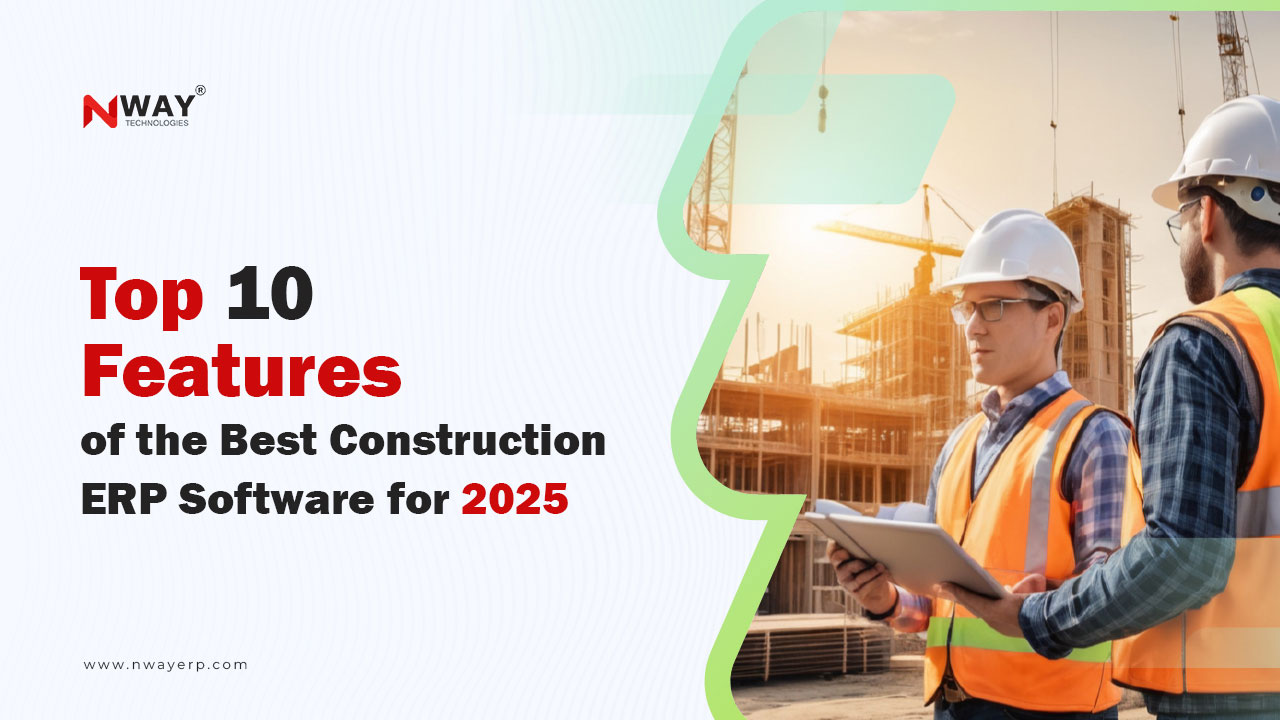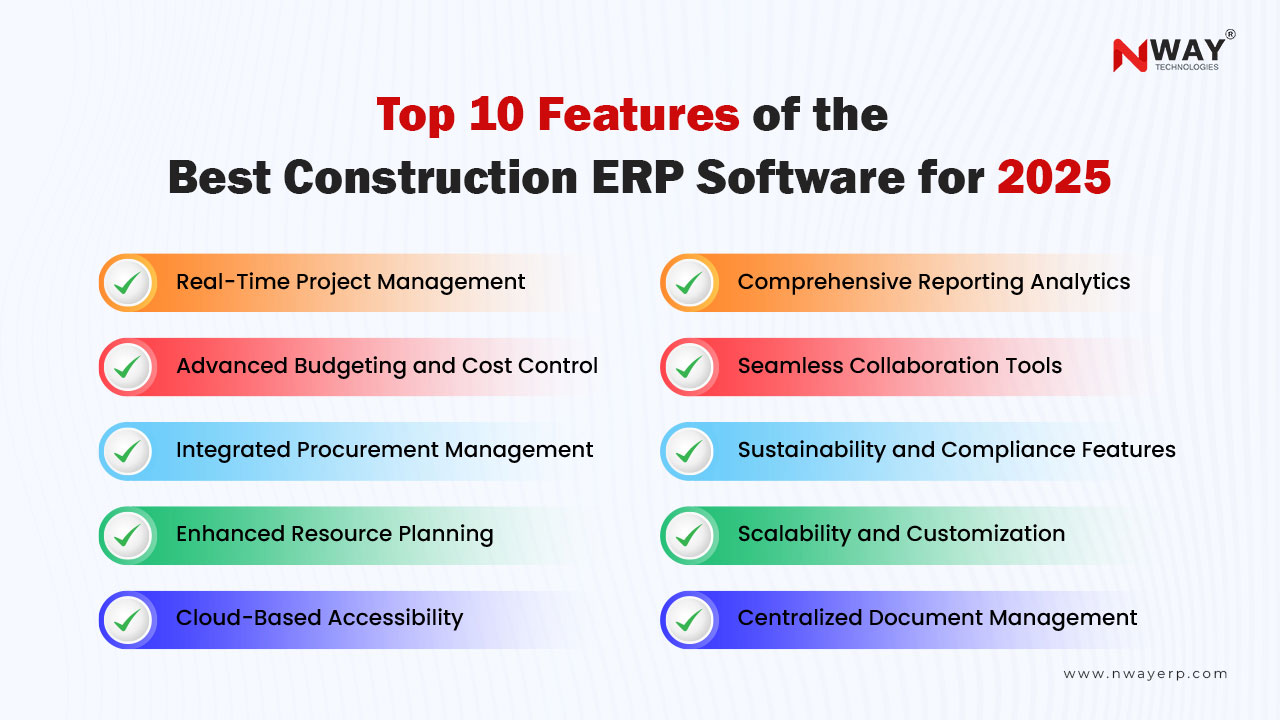The construction industry is one of the fastest-growing companies around the world. It is evolving rapidly, and contractors, subcontractors, and construction management professionals are more specifically looking to adopt technologies that can help them improve their processes eliminating major challenges. In 2025, companies must adopt construction ERP software that can stand as a cornerstone to streamline their operations and maintain a competitive advantage.
Read this blog to learn about the top 10 features that define usage and its worth for resolving major construction challenges and improving productivity in 2025.
Features of the Best Construction ERP Software for 2025
01. Real-Time Project Management
Project management is one of the most critical operations in any construction company. It involves multiple operations for multiple projects. A modern ERP for the construction industry provides real-time project management tools. It ensures that project managers can monitor every aspect of the projects– from timelines to ensure resource allocation without delays.
Why It Matters
ERP software ensures that all project operations go smoothly, avoiding any delays in communication or data and budget management. It also helps in keeping track of all activities and operations.
Key Capabilities
-
Instant Progress Tracking
-
Notifications and Alerts to Avoid Delays
-
Quick Dashboards for Analysis
02. Advanced Budgeting and Cost Control
Managing budgets in a construction business is crucial, it involves cost fluctuations due to materials, labor, or unexpected events. A good construction ERP system offers advanced budget management that helps predict, track, and optimize expenditures.
Why It Matters
Unchecked and uncontrolled costs can erode profitability. Construction ERP software can manage financial planning and budgeting and ensure proactive budget management.
Key Capabilities
-
Cost Analysis
-
Accurate Invoicing and Billing
-
Integration with Procurement, vendor management, inventory management, and more
03. Integrated Procurement Management
Procurement plays a crucial role in construction and the best construction ERP software helps in managing all the procurement operations connecting with suppliers, contractors, and project requirements.
Why It Matters
Manual procurement processes are prone to errors and delays. Integrated tools for construction ERP software will improve accuracy and efficiency.
Key Capabilities
-
Purchase Requisition
-
Vendor Performance Tracking
-
Inventory management
-
Effective Purchase Order Creation
-
Reporting & Analytics
04. Enhanced Resource Planning
The construction industry involves massive resources, whether it is a bridge, road, or a building, its construction processes include various resources like labor, equipment, or materials. Construction ERP software provides features that can manage all the resources and plan accordingly.
Why It Matters
Mismanagement or inaccurate usage of resources can lead to project delays and increased costs. It helps in effective planning and ensures optimal usage of resources.
Key Capabilities
-
Resource Scheduling and Forecasting
-
Management for Overlapping Projects
-
Equipment Maintenance Alerts
05. Cloud-Based Accessibility
Cloud-based solutions are the basic need of modern and tech-innovative organizations. In the construction industry, they play a vital role in connecting subcontractors, contractors, and other service stakeholders. Gone are the days when on-premise solutions were used. As technology enhances, construction companies in 2025 will need to opt for cloud-based solutions.
Why It Matters
The construction industry operates from on-site, off-site, and in offices. Cloud-based construction ERP software helps manage data accessibility and collaboration regardless of location.
Key Capabilities
-
Mobile App Integrations
-
Automatic Updates and Scalability
-
Enhanced Data Security Protocols
06. Comprehensive Reporting Analytics
Data is king in any organization and the construction companies, it plays an even more important role. These enable businesses to gain actionable insights into performance, costs, and efficiency.
Why It Matters:
Decisions backed by data are more likely to succeed. Analytics provide a clearer picture of project health and company performance.
Key Capabilities
-
Customizable Dashboards
-
Predictive Analytics for Risk Mitigation
-
KPI (Key Performance Indicator) tracking
07. Seamless Collaboration Tools
Construction involves multiple stakeholders, including contractors, subcontractors, and other senior managers, a modern construction ERP software includes features that foster seamless communication.
Why It Matters
Lack of communication can lead to errors, chaos, rework, and other confusion. Effective tools collaborate among all parties.
Key Capabilities
-
Role-based Access Controls
-
Real-time Messaging Platforms
08. Sustainability and Compliance Features
As sustainability takes center stage in 2025, ERP for the construction industry provides help to companies to meet environmental standards and comply with regulations.
Why It Matters
Regulatory non-compliance can lead to hefty fines and project delays. Effective tools help in improving a company’s brand image.
Key Capabilities
-
Compliance Management Tools
-
Resource Management Reduces Wastage of Resources
09. Scalability and Customization
Roads, highways, bridges, and other types of construction processes involve different needs. Construction ERP Software provides customizable solutions to scale and accommodate businesses of all sizes.
Why It Matters
A scalable ERP Software provides regular updates to enhance its services along with improving productivity in all aspects.
Key Capabilities
-
Industry-Specific Customizations
-
Scalable Cloud Infrastructure
10. Centralized Document Management
Managing the extensive documentation associated with construction projects like blueprints, contracts, and permits is essential. Construction ERP software helps in centralizing document management systems.
Why It Matters
Searching for misplaced documents can lead to delays and frustration. A centralized document management system offers quick access and better organization.
Key Capabilities
-
Secure Cloud-based Document Management
-
Version Control for Updated Files
-
Easy Sharing and Role-based Access
Conclusion
The construction industry is expanding rapidly, companies are increasingly opting for construction ERP software in 2025. It is helping companies in attaining intuitive, powerful, and adaptable results in their every project. By incorporating features like real-time project management, advanced analytics, centralized document management systems, and sustainability companies can address their major challenges. Investing in such an ERP for the Construction Industry helps streamline operations along with ensuring business continuity in a rapidly evolving environment.
Construction companies must evolve their specific needs and choose an ERP software that aligns with their operational goals. With the right tools, companies can achieve unprecedented efficiencies, cost savings, and project success. So what are your plans to grow and attain productivity in 2025? Have you opted for an ERP solution, if not it is the right time to choose the best ERP software for construction management, and if you are still using one then it is necessary to evaluate its worth and how it helped you achieve your desired goal.




